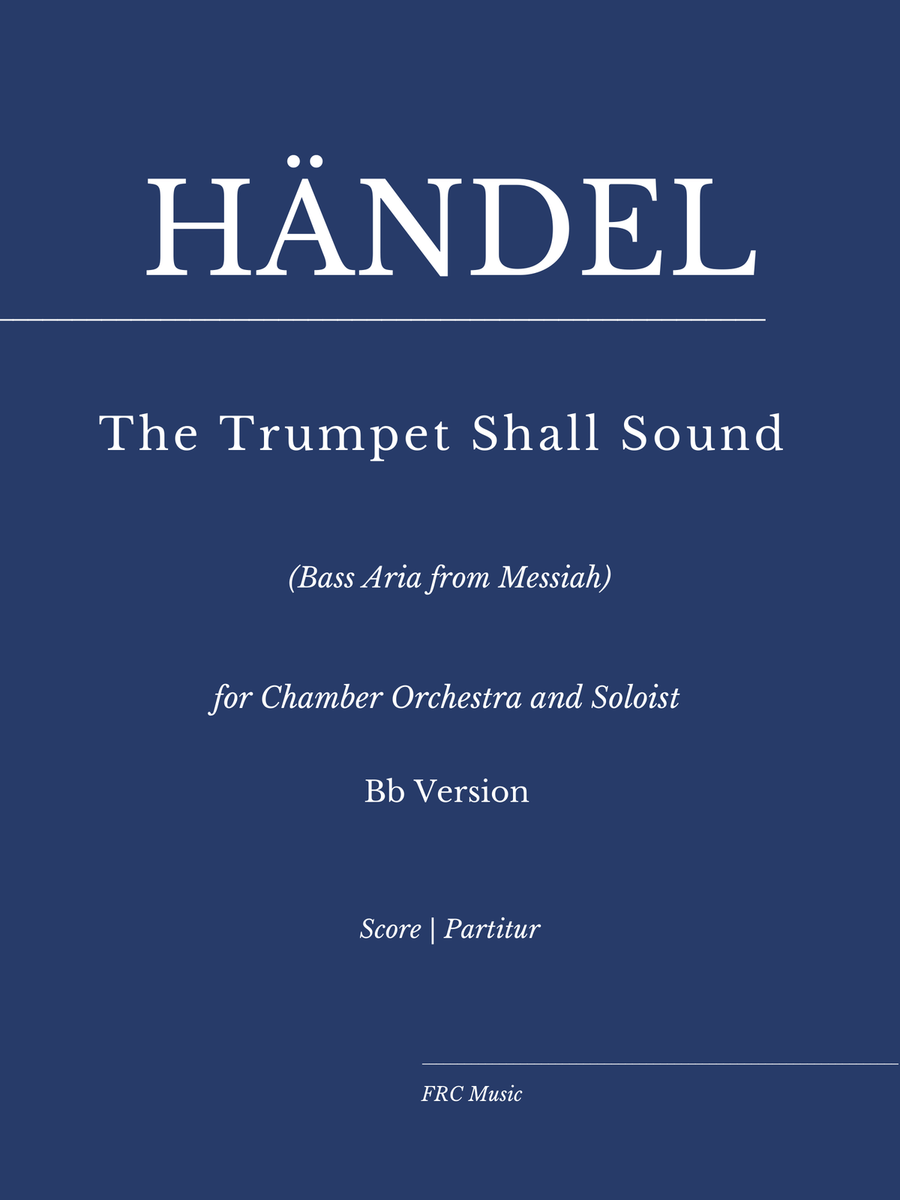Chamber Orchestra - Level 4 - Digital Download SKU: A0.1281935 By George Frideric Handel. By George Frideric Handel. Arranged by Flavio Regis Cunha. Baroque,Classical,Contest,Festival,Sacred,Wedding. Score and Parts. 43 pages. Flavio Regis Cunha #873288. Published by Flavio Regis Cunha (A0.1281935). Händel: The Trumpet Shall Sound for Bassoon, Trumpet in Bb, Bass Solo, Harpsichord and Strings (Bb)Experience the power of composition with the classic 'The Trumpet Shall Sound for Bassoon, Trumpet in Bb, Bass Solo, Harpsichord and Strings' composed by the masterful Georg Friedrich Händel. Brighten your church or school orchestra with the timeless beauty of this work. Professional orchestras can stand out with its unique combination of instruments and dazzling strings. Treat your audience to this masterpiece for a night that will not be forgotten. Get your sheet music today and create a moment in music history with 'The Trumpet Shall Sound for Bassoon, Trumpet in Bb, Bass Solo, Harpsichord and Strings' by Händel.ðµ Introducing a Musical Masterpiece: The Trumpet Shall Sound Sheet Music! ðµAre you ready to elevate your church, school, or professional orchestra performances to new heights of grandeur? Look no further! Unveil the majestic beauty of Georg Friedrich Händel's timeless composition with our meticulously crafted sheet music for The Trumpet Shall Sound.ð¶ Experience the Elegance:Imagine the resounding harmony of a Bassoon and a Trumpet in Bb, accompanied by a captivating Bass Solo, the enchanting tones of a Harpsichord, and the lush backdrop of Strings. This composition is a celebration of musical artistry that will captivate hearts and souls.ð Elevate Your Performance:Whether you're aiming for a heavenly church performance, an educational masterpiece at your school, or a captivating showcase by your professional orchestra, The Trumpet Shall Sound offers a perfect blend of elegance, energy, and emotion. Leave your audience in awe as you bring this iconic piece to life.ð» Immerse in Musical History:Georg Friedrich Händel's compositions have stood the test of time, enchanting generations with their unparalleled beauty. Now, you have the opportunity to immerse yourself in this rich musical heritage and deliver a performance that resonates with every listener.ð Our Sheet Music:With utmost care, our sheet music has been transcribed to ensure accuracy and authenticity, capturing every intricate nuance of Händel's original masterpiece. Each note, each crescendo, and each glorious moment has been preserved for you to bring to life.ð¥ Stand Out with Excellence:Set your performance apart with The Trumpet Shall Sound. Let the passion of Händel's music course through your ensemble, creating a lasting impact that will be talked about for years to come.ð Join the Musical Journey:Bring together the majestic harmonies of Bassoon, Trumpet in Bb, Bass Solo, Harpsichord, and Strings in a symphonic experience that will leave your audience mesmerized. Elevate your church, school, or professional orchestra's performance and become part of a musical journey that transcends time.ð Get your The Trumpet Shall Sound sheet music today and prepare to deliver a performance that echoes through the ages. Unleash the power of Händel's genius and create a musical memory that will be cherished forever.Visit our website now to get your copy and embark on a transformative musical adventure! ð¼ð Get Your Sheet Music Now#MajesticHarmony #MusicalElegance #HändelMagicðµ Let the trumpets sound, and let your performance resound with brilliance! ðµAdvanced Intermediate LevelFormat: Concert, 9 x 12 inches43 pages.
